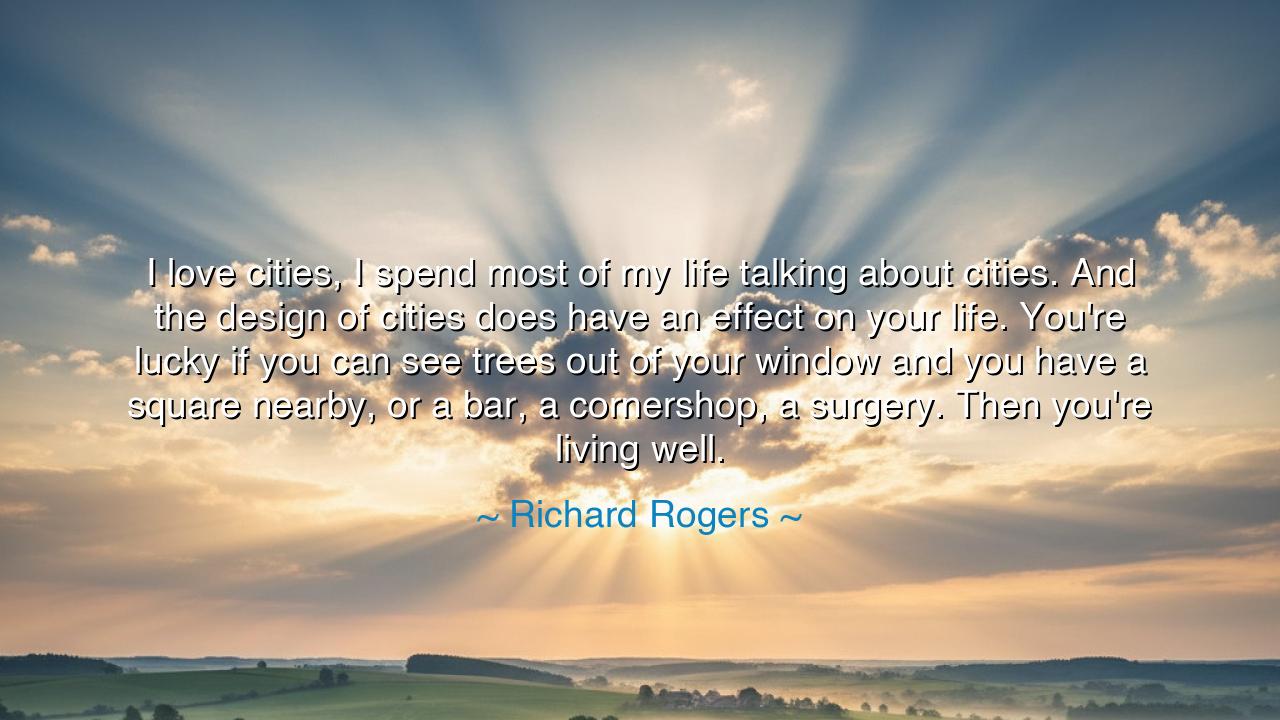
I love cities, I spend most of my life talking about cities. And
I love cities, I spend most of my life talking about cities. And the design of cities does have an effect on your life. You're lucky if you can see trees out of your window and you have a square nearby, or a bar, a cornershop, a surgery. Then you're living well.






“I love cities, I spend most of my life talking about cities. And the design of cities does have an effect on your life. You're lucky if you can see trees out of your window and you have a square nearby, or a bar, a cornershop, a surgery. Then you're living well.” Thus spoke Richard Rogers, the great architect of our age, whose mind saw cities not as cages of stone, but as living hearts that beat with the rhythm of humanity itself. His words are not those of mere admiration for urban beauty—they are a hymn to the soul of the city, to the way our surroundings shape our spirit, and how the presence or absence of thoughtful design can nurture or starve the human heart.
To love cities, as Rogers did, is to love humanity in its highest concentration. For cities are not mere gatherings of buildings—they are mirrors of civilization, the embodiment of our collective hope to live together in harmony. Each street is a memory, each square a pulse of shared life. A city well-designed is like a symphony: its parks are the pauses of breath, its streets the flowing melody, its people the instruments through which the music of life resounds. When Rogers spoke of the fortune of seeing trees outside one’s window, he spoke not of luxury but of balance—the harmony between man and nature that keeps the soul from hardening in the noise of progress.
In the time of the ancients, cities were sacred. Athens was not only a city of stone and marble, but a garden of minds. There, the agora—an open square—was the beating heart of democracy. Citizens met beneath the sky to speak of philosophy, justice, and art. The city’s design encouraged communion, dialogue, and virtue. For the design of cities, as Rogers reminds us, does have an effect on life. When the streets are open, the minds of the people open too; when there is light, justice can grow; when there is beauty, kindness follows.
But when cities forget their soul—when concrete walls rise high but no trees grow between them—then the human spirit falters. There are modern cities that have become deserts of steel, where no laughter echoes and no neighbor knows the other. Such cities crush not only time but tenderness. Rogers warned against this quiet tragedy. He believed that to live well is not to live lavishly, but to live connectedly—to have a place where one can walk, breathe, greet, and belong. For in belonging, one finds peace.
Consider the tale of Jane Jacobs, the fierce defender of New York’s neighborhoods. In the 1960s, when great men sought to tear down the old and replace it with highways and towers, she stood as one woman against the tide. She believed, as Rogers did, that the life of cities came not from concrete and plans, but from people and their streets—from children playing on sidewalks, shopkeepers who knew your name, and the warmth of lighted windows after dusk. Her victory preserved the human scale of the city, reminding the world that a city without heart is but an empty shell.
The wisdom of Rogers, therefore, is both ancient and eternal: that the design of our dwellings shapes the design of our destiny. If you live among beauty, you become gentle; if you live among order, you become clear of mind; if you live among community, you become strong of heart. A city that offers trees and cornershops, laughter and shade, is not merely a place—it is a form of love, built in stone and song.
Let each of us, then, be builders not only of structures but of spaces for life. Plant trees where there are none. Speak to your neighbors. Walk through your streets and know them. Defend the small squares where children play, for they are the roots of peace. If you are an architect, build with grace; if you are a citizen, care with courage.
For when you look from your window and see the green of a tree, when you step into the square and feel the hum of life, when the corner bar greets you by name—then, as Rogers said, you are living well. And in that simple fortune lies the wisdom of the ages: that heaven is not always found in distant skies, but often, right outside your window.






AAdministratorAdministrator
Welcome, honored guests. Please leave a comment, we will respond soon